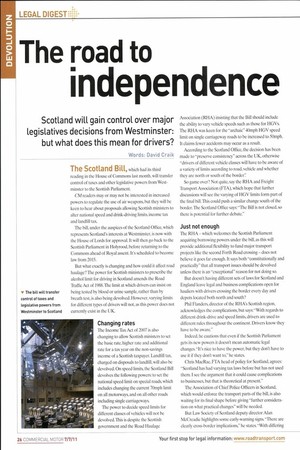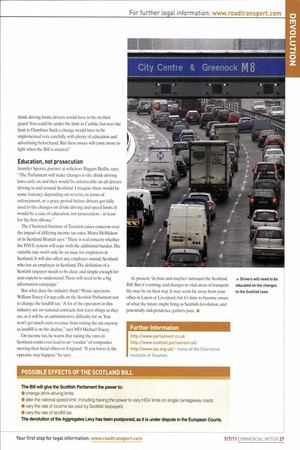The !woad to
Page 26

Page 27

If you've noticed an error in this article please click here to report it so we can fix it.
independence
Scotland will gain control. over major legislatives decisions from Westminster: but what does this mean for drivers?
Words: David Craik The Scotland Bill, which had its third reading in the House of Commons last month, will transfer control of taxes and other legislative powers from Westminster to the Scottish Parliament.
CM readers may or may not be interested in increased powers to regulate the use of air weapons, but they will be keen to hear about proposals allowing Scottish ministers to alter national speed and drink-driving limits, income tax and landfill tax.
The bill, under the auspices of the Scotland Office, which represents Scotland's interests at Westminster, is now with the House of Lords for approval. It will then go back to the Scottish Parliament in Holyrood, before returning to the Commons ahead of Royal assent. Its scheduled to become law from 2015.
But what exactly is changing and how could it affect road haulage? The power for Scottish ministers to prescribe the alcohol limit for driving in Scotland amends the Road Traffic Act of 1988. The limit at which drivers can insist on being tested by blood or urine sample, rather than by breath test, is also being devolved. However, varying limits for different types of drivers will not, as this power does not currently exist in the UK.
Changing rates
The Income Tax Act of 2007 is also changing to allow Scottish ministers to set the basic rate, higher rate and additional rate for a tax year on the non-savings income of a Scottish taxpayer. Landfill tax, charged on disposals to landfill, will also be devolved. On speed limits, the Scotland Bill devolves the following powers: to set the national speed limit on special roads, which includes changing the current 70mph limit on all motorways, and on all other roads including single carriageways The power to decide speed limits for different classes of vehicles will not be devolved. This is despite the Scottish government and the Road Haulage Association (RHA) insisting that the Bill should include the ability to vary vehicle speeds such as those for HGVs The RHA was keen for the "archaic" 40mph HGV speed limit on single carriageway roads to be increased to 50mph. It claims fewer accidents may occur as a result.
According to the Scotland Office, the decision has been made to "preserve consistency" across the UK, otherwise "drivers of different vehicle classes will have to be aware of a variety of limits according to road, vehicle and whether they are north or south of the border': So game over? Not quite, say the RHA and Freight Transport Association (FTA), which hope that further discussions will see the varying of HGV limits form part of the final bill. This could push a similar change south of the border. The Scotland Office says: "The Bill is not closed, so there is potential for further debate."
Just not enough
The RHA — which welcomes the Scottish Parliament acquiring borrowing powers under the bill, as this will provide additional flexibility to fund major transport projects like the second Forth Road crossing — does not believe it goes far enough. It says both "constitutionally and practically" that all transport issues should be devolved unless there is an "exceptional" reason for not doing so.
But doesn't having different sets of laws for Scotland and England leave legal and business complications open for hauliers with drivers crossing the border every day and depots located both north and south?
Phil Flanders, director of the RHA's Scottish region, acknowledges the complications, but says: "With regards to different drink-drive and speed limits, drivers are used to different rules throughout the continent. Drivers know they have to be aware."
Indeed, he cautions that even if the Scottish Parliament gets its new powers it doesn't mean automatic legal changes "It's nice to have the power, but they don't have to use it if they don't want to," he states Chris MacRae, FTA head of policy for Scotland, agrees: "Scotland has had varying tax laws before but has not used them. I see the argument that it could cause complications to businesses, but that is theoretical at present."
The Association of Chief Police Officers in Scotland, which would enforce the transport parts of the bill, is also waiting for its final shape before giving "further consideration on what practical changes" will be needed.
But Law Society of Scotland deputy director Alan McCreadie highlights some early-warning signs "There are clearly cross-border implications," he states. "With differing drink-driving limits, drivers would have to be on their guard. You could be under the limit in Carlisle, but over the limit in Dumfries Such a change would have to be implemented very carefully, with plenty of education and advertising beforehand. But these issues will come more to light when the Bill is enacted."
Education, not prosecution Jennifer Spence, partner at solicitors Biggart Baillie, says: "The Parliament will make changes to the drink-driving laws early on and they would be enforceable on all drivers driving in and around Scotland. I imagine there would be some leniency, depending on severity, in terms of enforcement, or a grace period before drivers got fully used to the changes on drink-driving and speed limits. It would be a case of education, not prosecution — at least for the first offence."
The Chartered Institute of Taxation raises concerns over the impact of differing income tax rates. Moira McMahon of its Scotland Branch says: "There is real concern whether the PAYE system will cope with the additional burden. The variable rate won't only be an issue for employers in Scotland. It will also affect any employer outside Scotland who has an employee in Scotland. The definition of a Scottish taxpayer needs to be clear, and simple enough for non-experts to understand.There will need to be a big information campaign."
But what does the industry think? Waste operators William Tracey Group calls on the Scottish Parliament not to change the landfill tax. "A lot of the operators in this industry are on national contracts. Just leave things as they are, as it will be an administrative difficulty for us. You won't get much extra revenue from raising the tax anyway as landfill is on the decline," says MD Michael Tracey.
On income tax, he warns that raising the rates in Scotland could even lead to an "exodus" of companies moving their head offices to England. "If you lower it, the opposite may happen," he says. At present, 'ifs, buts and maybes' surround the Scotland Bill. But its coming, and changes to vital areas of transport life may be on their way. It may seem far away from your office in Luton or Liverpool, but it's time to become aware of what the future might bring as Scottish devolution, and potentially independence, gathers pace. • Further Information Ihttp://www.parliament.co.uk http://www.scottish.partiament.uk/ http://www.tax.org.uk/ home of the Chartered Institute of Taxation.
POSSIBLE EFFECTS OF THE SCOTLAND BILL
The Bill will give the Scottish Parliament the power to: • change drink-driving limits;
• alter the national speed limit, including having the power to vary HGV limits on single carriageway roads; • vary the rate of income tax paid by Scottish taxpayers; • vary the rate of landfill tax.
The devolution of the Aggregates Levy has been postponed, as it is under dispute in the European Courts.








































































































































